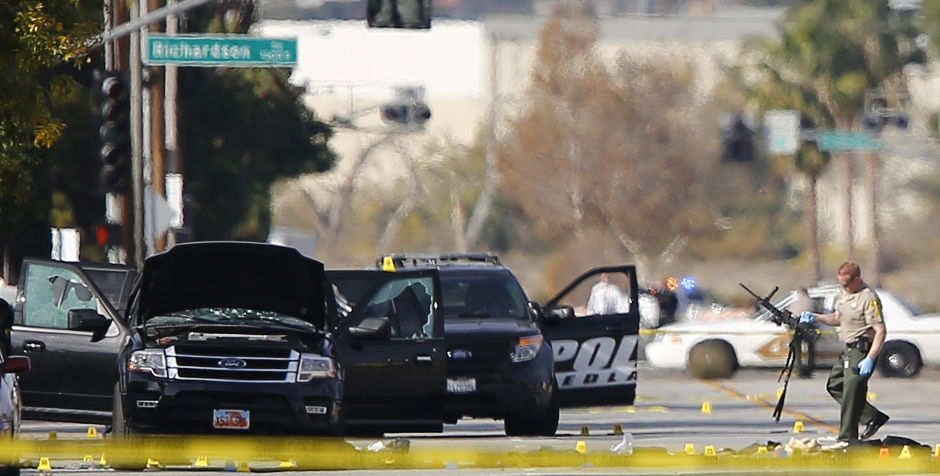What the Law Says about Terrorism & San Bernardino
On Friday, the FBI confirmed what many of us had suspected for days – the attacks carried out by Syed Farook and his wife, Tashfeen Malik, who murdered 14 and wounded 21, should be investigated as terrorism.
David Bowdich, assistant director in charge of the FBI in Los Angeles, stated, “Based on information and the facts as we know them, we are now investigating these horrific acts as acts of terrorism.” He also discussed how the couple attempted to destroy their “digital footprint” and that investigations are underway into reports of Malik allegedly pledging her allegiance to ISIS on Facebook the day of the attacks.
VICE News reports there have been 17 jihadist terrorism attacks on U.S. soil since 9/11/2001. The attacks in San Bernardino mark the 18th attack.
So what is the legal basis of investigating something as terrorism versus investigating something as workplace violence or another form of mass murder?
In the last several days, there has been some confusion regarding whether the attacks perpetrated constituted “terrorism.”
When speaking of “terrorism,” one recognizes early on that there is no universally accepted definition of terrorism. Even within agencies of the U.S. Government, different definitions are used. For example, the U.S. Code of Federal Regulations defines “terrorism” as “the unlawful use of force and violence against persons or property to intimidate or coerce a government, the civilian population, or any segment thereof, in furtherance of political or social objectives.” The Department of Defense defines “terrorism” as “the unlawful use of violence or threat of violence to instill fear and coerce governments or societies. Terrorism is often motivated by religious, political, or other ideological beliefs and committed in the pursuit of goals that are usually political.”
The FBI, as the chief federal law enforcement agency, is bound by the definition found in the criminal statutes of the United States. Accordingly, the FBI uses the following definition of “Domestic Terrorism”:
“Domestic terrorism” means activities that—
(A) involve acts dangerous to human life that are a violation of the criminal laws of the United States or of any State;
(B) appear to be intended—
- (i) to intimidate or coerce a civilian population;
- (ii) to influence the policy of a government by intimidation or coercion; or
- (iii) to affect the conduct of a government by mass destruction, assassination, or kidnapping; and
(C) occur primarily within the territorial jurisdiction of the U.S.
For the purpose of the FBI investigation, this statute is the most important. Joe Palazzolo in the Wall Street Journal explains:
Categorizing attacks as terrorism serves practical as well as legal purposes, ensuring that the FBI will be the lead investigative agency rather than local authorities, legal experts said. The definition also brings to bear partnerships between the FBI and local law enforcement known as Joint Terrorism Task Forces.
So, legally speaking, how did the FBI reach the conclusion that this is terrorism? They looked at the elements of the criminal statute (18 U.S.C. § 2331) and realized that most of the clues unearthed by the investigation pointed to terrorism.
The first element is easily satisfied. Farook and Malik carried out deadly attacks with tactical weapons, intending to use even more weapons and more explosives to murder even more people, a clear violation of the criminal statutes in the U.S.
The second element is the one that has caused the most debate. Did their actions intend to intimidate or coerce a civilian population OR influence the policy of a government by intimidation or coercion OR affect the conduct of a government by mass destruction, assassination, or kidnapping? Only one of these sub elements must be satisfied. And it appears that enough information has been gathered by the FBI to reveal that these attacks were intended to do at least one of these three things, if not all three of them.
After all, even if members of ISIS did not direct these attacks explicitly, they have created global propaganda encouraging their supporters to carry out attacks just like these in the United States and around the world. And there are enough reported allegations of Farook and possibly Malik being in touch with people on international terrorism watch lists. Federal officials are also reporting that Malik posted her allegiance to ISIS moments before the terrorist attack.
So now the FBI continues its investigation, and it’s time for U.S. citizens to urge their elected leaders to finally realize the evil facing our nation and the world. It’s time for us to do everything we can to protect our homeland from future attack while seeking out ISIS to destroy them once and for all.
